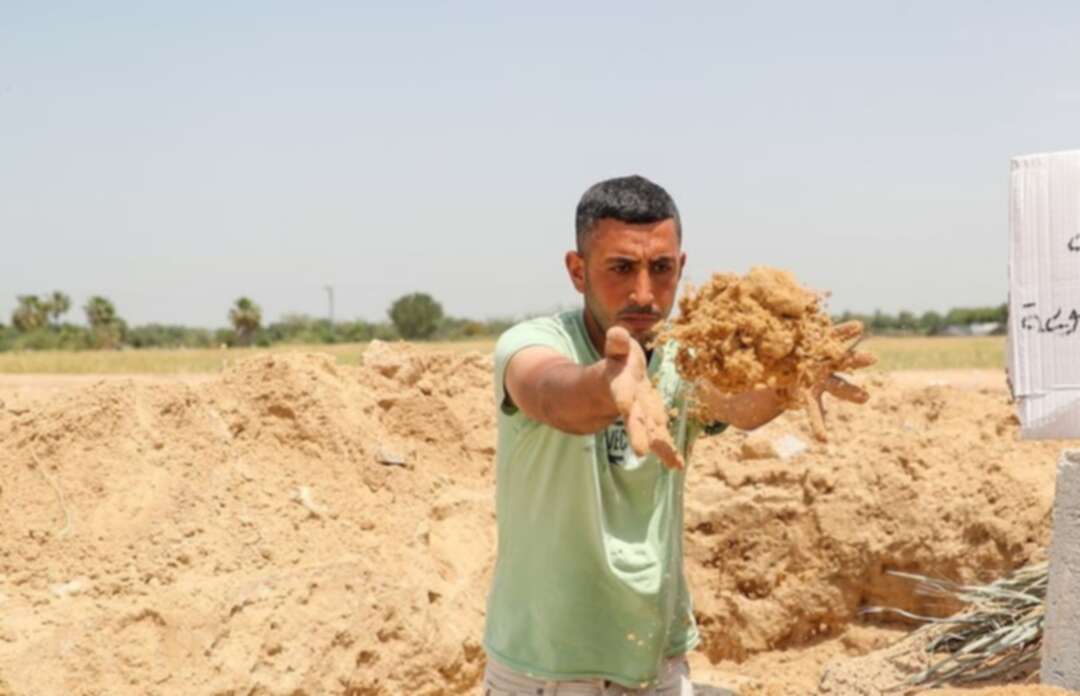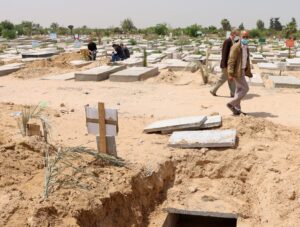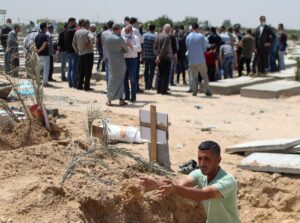-
Gaza gravediggers, medics stretched as COVID-19 cases surge during Ramadan

The sick and dying are rapidly pushing Gaza’s hospitals close to capacity amid a surge in COVID-19 cases in the impoverished Palestinian territory, health officials said.
Palestinians fear a combination of poverty, medical shortages, vaccine skepticism, poor COVID-19 data and mass gatherings during Ramadan could accelerate the increase, which began before the start of the Muslim holy month on April 13.
Gaza health officials said around 70 percent of intensive care unit beds were occupied, up from 37 percent at the end of March. There were 86 deaths over the past six days, an increase of 43 percent over the week before.
“The hospitals are almost at full capacity. They’re not quite there yet, but severe and critical cases have increased significantly in the last three weeks, which is a concern,” said Dr Ayadil Saparbekov, head of the World Health Organization’s Health Emergencies Team in the Palestinian Territories.
Gaza’s daily positivity rate reached as high as 43 percent this week, although Saparbekov said that number could be inflated because a shortage of tests meant they were mostly given to people already showing symptoms.
 Palestinians walk past a grave dug for a coronavirus disease (COVID-19) victim, at a cemetery, east of Gaza City April 20, 2021. Picture taken April 20, 2021. (Reuters)
Palestinians walk past a grave dug for a coronavirus disease (COVID-19) victim, at a cemetery, east of Gaza City April 20, 2021. Picture taken April 20, 2021. (Reuters)Saparbekov also said Gaza does not have the capacity to identify highly infectious COVID-19 variants when testing, meaning there is little data on them.
‘No truce’
Graveyards are also feeling the strain. In Gaza City, gravedigger Mohammad al-Haresh told Reuters he had been burying up to 10 COVID-19 victims per day, up from one or two a month ago.
“Wartime was difficult, but the coronavirus has been much harder for us,” said Haresh, who dug graves throughout the 2014 Israel-Gaza war.
“In war, we would dig graves or bury the dead during a truce or ceasefire. With the coronavirus, there is no truce.”
Densely populated and home to 2 million Palestinians, Gaza has for years had limited access to the outside world because of a blockade led by Israel and supported by Egypt.
Both countries cite security concerns over Hamas, the Islamist militant group that controls the Gaza Strip, saying they want to stop money and weapons entering.
Palestinians say the blockade amounts to collective punishment and that it has crippled Gaza’s economy and medical infrastructure, with shortages of critical supplies and equipment hampering their ability to tackle the pandemic.
 Palestinian worker Mohammad al-Haresh, 30, digs a grave for a coronavirus disease (COVID-19) victim, at a cemetery, east of Gaza City April 20, 2021. Picture taken April 20, 2021. (Reuters)
Palestinian worker Mohammad al-Haresh, 30, digs a grave for a coronavirus disease (COVID-19) victim, at a cemetery, east of Gaza City April 20, 2021. Picture taken April 20, 2021. (Reuters)The situation in Gaza is a stark contrast to Israel, where a world-beating vaccination rollout has led to more than 53 percent of Israelis being fully vaccinated.
Ramadan lockdown
Amid growing concern, Hamas will on Thursday begin a week of nightly curfews, shutting down mosques that host hundreds of worshippers for Ramadan evening prayers.
But with around 49 percent of Gazans unemployed and parliamentary elections slated for May 22, Hamas has held back from more drastic measures that could further damage the economy.
“We may impose additional measures, but we do not expect at this phase to go into a full lockdown,” Hamas spokesman Eyad Al-Bozom said.
Health officials say the factors that led to the current spike include the flouting of guidelines for mask-wearing and social distancing and the opening in February of Gaza’s border with Egypt, which may have allowed in new variants.
Suspicion of vaccines also runs deep. A majority of Gazans - 54.2 percent - said they would not take the vaccine, against 30.5 percent who said they would and 15.3 percent who were undecided, according to an April 21 survey by the Jerusalem Media and Communications Center.
Just 34,287 people have been vaccinated, even though the enclave has received 109,600 doses since February donated by Russia, the United Arab Emirates and the global COVAX program.
“(The) reluctance of many, including medical staff, to be vaccinated remains a key concern,” the United Nations Office for the Coordination of Humanitarian Affairs said in an April 12 report.
One Palestinian eligible for Gaza’s initial round of vaccines, Qasem Abdul Ghafoor, said he decided to get the jab to protect himself and his family.
“The situation here is horrific. We took it lightly before, but I assure you, it should not be taken lightly,” he said.
source: Reuters
Image source: Reuters
Levant
You May Also Like
Popular Posts
Caricature
BENEFIT Sponsors BuildHer...
- April 23, 2025
BENEFIT, the Kingdom’s innovator and leading company in Fintech and electronic financial transactions service, has sponsored the BuildHer CityHack 2025 Hackathon, a two-day event spearheaded by the College of Engineering and Technology at the Royal University for Women (RUW).
Aimed at secondary school students, the event brought together a distinguished group of academic professionals and technology experts to mentor and inspire young participants.
More than 100 high school students from across the Kingdom of Bahrain took part in the hackathon, which featured an intensive programme of training workshops and hands-on sessions. These activities were tailored to enhance participants’ critical thinking, collaborative problem-solving, and team-building capabilities, while also encouraging the development of practical and sustainable solutions to contemporary challenges using modern technological tools.
BENEFIT’s Chief Executive Mr. Abdulwahed AlJanahi, commented: “Our support for this educational hackathon reflects our long-term strategic vision to nurture the talents of emerging national youth and empower the next generation of accomplished female leaders in technology. By fostering creativity and innovation, we aim to contribute meaningfully to Bahrain’s comprehensive development goals and align with the aspirations outlined in the Kingdom’s Vision 2030—an ambition in which BENEFIT plays a central role.”
Professor Riyadh Yousif Hamzah, President of the Royal University for Women, commented: “This initiative reflects our commitment to advancing women in STEM fields. We're cultivating a generation of creative, solution-driven female leaders who will drive national development. Our partnership with BENEFIT exemplifies the powerful synergy between academia and private sector in supporting educational innovation.”
Hanan Abdulla Hasan, Senior Manager, PR & Communication at BENEFIT, said: “We are honoured to collaborate with RUW in supporting this remarkable technology-focused event. It highlights our commitment to social responsibility, and our ongoing efforts to enhance the digital and innovation capabilities of young Bahraini women and foster their ability to harness technological tools in the service of a smarter, more sustainable future.”
For his part, Dr. Humam ElAgha, Acting Dean of the College of Engineering and Technology at the University, said: “BuildHer CityHack 2025 embodies our hands-on approach to education. By tackling real-world problems through creative thinking and sustainable solutions, we're preparing women to thrive in the knowledge economy – a cornerstone of the University's vision.”
opinion
Report
ads
Newsletter
Subscribe to our mailing list to get the new updates!






















